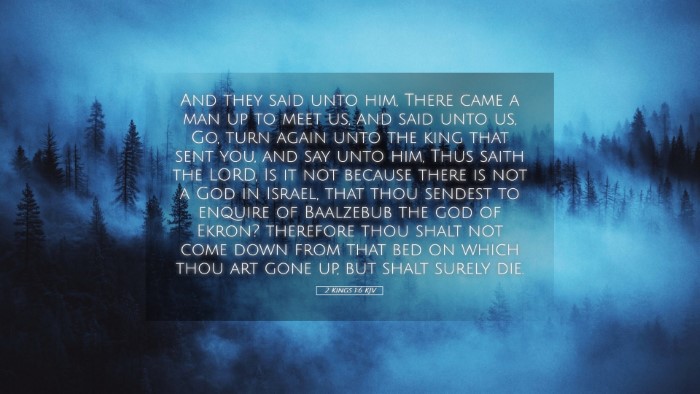Old Testament
Genesis Exodus Leviticus Numbers Deuteronomy Joshua Judges Ruth 1 Samuel 2 Samuel 1 Kings 2 Kings 1 Chronicles 2 Chronicles Ezra Nehemiah Esther Job Psalms Proverbs Ecclesiastes Song of Solomon Isaiah Jeremiah Lamentations Ezekiel Daniel Hosea Joel Amos Obadiah Jonah Micah Nahum Habakkuk Zephaniah Haggai Zechariah Malachi2 Kings 1:6
2 Kings 1:6 KJV
And they said unto him, There came a man up to meet us, and said unto us, Go, turn again unto the king that sent you, and say unto him, Thus saith the LORD, Is it not because there is not a God in Israel, that thou sendest to enquire of Baalzebub the god of Ekron? therefore thou shalt not come down from that bed on which thou art gone up, but shalt surely die.
2 Kings 1:6 Bible Commentary
Commentary on 2 Kings 1:6
Verse Text: "And they said unto him, There came a man up to meet us, and said unto us, Go, turn again unto the king that sent you, and say unto him, Thus saith the Lord, Is it not because there is not a God in Israel that ye go to inquire of Baalzebub the god of Ekron?"
Introduction
The narrative in 2 Kings 1:6 centers on the prophetic ministry during the reign of King Ahaziah of Israel, highlighting the conflict between the worship of Yahweh and the idolatrous practices commonly adopted by the kings of Israel, particularly the consulting of foreign deities. This verse serves as a critical turning point, emphasizing divine revelation and the importance of true worship.
Context and Background
During this period, the Kingdom of Israel was characterized by instability and spiritual decline. After the death of Ahab, the nation continued its slide into idolatry. Ahaziah, Ahab’s son, sought counsel from Baalzebub, the god of Ekron, indicating a blatant disregard for the God of Israel. The prophet Elijah is sent to confront this idolatry, demonstrating God’s desire to guide His people back to Him.
Analysis of Key Themes
The Role of Prophecy
This verse emphasizes the role of prophets in Israel, acting as messengers of God. Elijah's encounter with the emissaries underscores the prophetic responsibility to steer the king back to the worship of Yahweh. As noted by Matthew Henry, God’s message comes with a sense of urgency, calling Ahaziah to reconsider his actions.
Idolatry and Its Consequences
The reference to Baalzebub, “the god of Ekron,” illustrates the tension between Yahweh worship and idol worship prevalent in Israel’s society. Albert Barnes highlights that this inquiry into a foreign god is a direct affront to the God of Israel, prompting divine judgment. This incident reflects a broader theme throughout the Old Testament concerning the dangers of idolatry and the inevitable consequences when the people of God turn away from Him.
Divine Sovereignty and Human Responsibility
Elijah's prophetic declaration speaks volumes about God’s sovereignty. The message delivered through the emissaries reminds the audience that the Lord is not distant; He is actively involved in the affairs of Israel. Adam Clarke emphasizes that God's invitation to return to Him shows mercy amidst impending judgment and demonstrates that while God is sovereign, human beings must respond to His revelation responsibly.
Reflections on the Text
The implications of 2 Kings 1:6 extend beyond its historical context to resonate with contemporary audiences. The struggle between fidelity to God and the allure of worldly alternatives remains pertinent today. Pastors and theologians can draw on this narrative to urge congregations to evaluate their own “gods” – the pursuits and idols that may distract from a faithful walk with God.
Conclusion
This verse from 2 Kings serves as both a warning and a call to action. The divine message delivered through Elijah necessitates a response from Ahaziah and consequently invites reflection from us today. Just as the King was challenged to acknowledge the supremacy of Yahweh, so are we constantly faced with the choice of whom we will serve. In a world filled with distractions, the call to return to God remains as relevant now as it was then.
Final Thoughts
- For Pastors: Use this passage to highlight the importance of prophetic voices in today's context, leading congregations back to a rightful worship of God.
- For Students and Theologians: Consider the interplay between divine revelation and human decisions as a foundational theme in understanding biblical prophecy.
- For Scholars: Analyze the historical context of idolatry within Israel to draw parallels to contemporary society and the ongoing struggle against various forms of idolatry.


